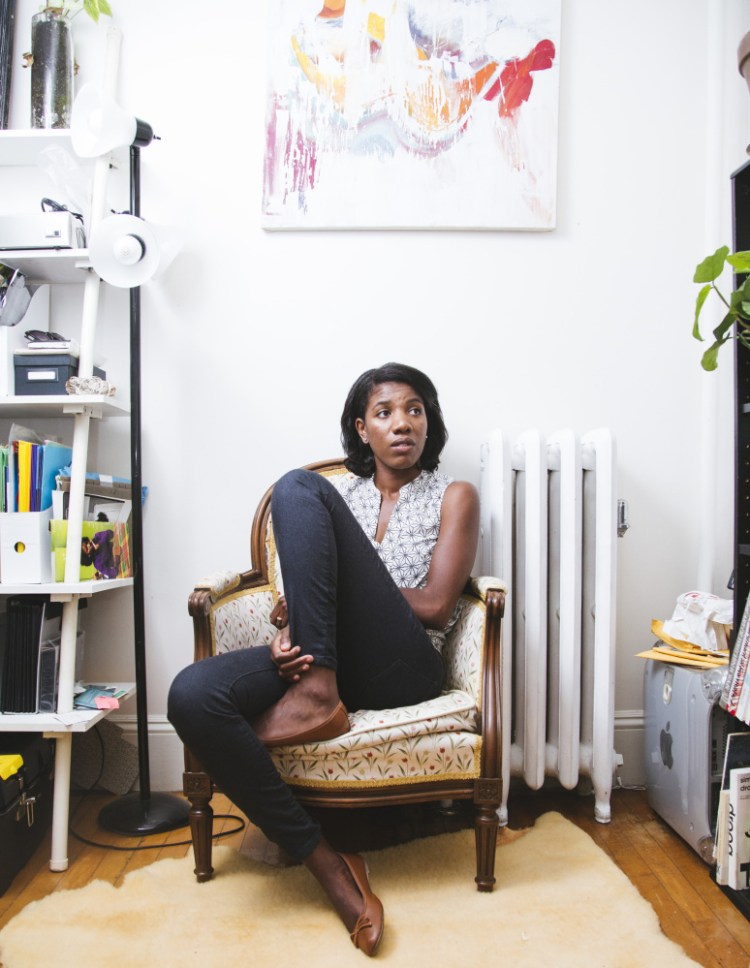Edwige Charlot lives for “unexpected discoveries.” They occur at the printing press, when she pulls a print and finds something that surprises her. “That’s when I do my celebration dance,” she said.
Charlot, 28, makes art that combines printmaking, painting and drawing. She calls it her “visual Creole,” because it often reflects her French and Haitian background in color, energy and content. Her work, she said, is about finding home. She was born in France to Haitian parents and moved to Connecticut at age 9. She’s been in Maine 10 years, settling in Portland after graduating from the Maine College of Art as a printmaking major.
She shows her work across the Northeast. She’s had two solo shows in Portland and others in Connecticut and New Jersey. She also won an award recognizing emerging artists from St. Botolph Club Foundation in Boston.
Charlot uses her prints as a starting point for her art. The prints serve as source material for larger projects. “For me, printmaking is a way to let the prints and the press tell you what’s next,” she says, terming the process “controlled chaos.” After making prints, she adds other elements, including paint, so the print serves as a foundation for a larger image.
Being an artist means being open-minded to an unforeseen outcome and accepting something unexpected as a gift. It’s about solving problems and being flexible and adaptable.
That’s true not only for the art itself, but for the life of an artist, and especially a young artist trying to establish a career and a path forward. It’s not an easy road, and success is based on commitment, self-confidence and a desire for self-expression. To help support her art, she also works as a freelance designer.
Charlot grew up in a family of high-achieving athletes, and it was expected she would study to become a doctor or lawyer or something similar. She found comfort in art, where her teachers gave her the breathing room to find an activity that she enjoyed and in which she demonstrated natural ability. When she enrolled at MECA, she first studied graphic design and moved to printmaking because the process of making prints felt more aesthetically pleasing and creative.
Studying printmaking is one thing. Doing it after graduation is another. At school, she had 24/7 access to printing presses and materials. After graduation, she lost that. Few artists own printing presses, and it’s expensive to join a community press.
To make prints, Charlot applies for residencies that offer the use of a press. When she gets one, she prints “like a maniac. I print and print and print. When I am in a residency setting, I am cranking. There’s not a lot of thinking. There may be conversations, but the thinking comes later.”
At home, she considers the work she started and how to proceed. She is between projects now – or as she phrases it, “I am in the thinking part of the artist’s creative cycle.”
Lately, she’s thinking about the issues of the day: race in America, immigration and a living wage, all of which touch her life directly. As a woman of color in Portland, she feels she stands out “like a sore thumb.” Portland may be a diverse city, but to her that is code for more black than the rest of Maine, which isn’t very much.
As a French native of Haitian background, she is sensitive to immigration issues in a way that many of her peers are not, because she is one. And as an artist just starting her career, she understands what it’s like to cobble jobs together to make a living. Her mother took three jobs to support the family when it resettled in Connecticut, and Charlot began working at age 15 to ease the financial strain on her household.
Her next body of work is evolving, and it likely will reflect some of those themes.
She is not complaining. Being an artist is a privilege, she said, and not something she takes lightly.
“In my eyes, artists from the beginning of time have been thought of as leaders and activists,” she said. “An artist’s job is to tell the truth and keep us accountable.”
Send questions/comments to the editors.




Comments are no longer available on this story